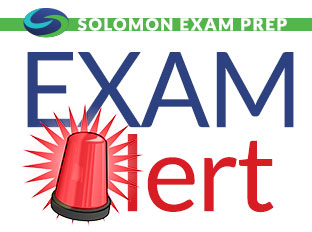This month’s study question from the Solomon Online Exam Simulator question database is now available. Relevant to the Series 6, 7, 24, 26, 27, and 28. –ANSWER POSTED– Continue reading
This month’s study question from the Solomon Online Exam Simulator question database is now available.
***Submit your answer to info@solomonexamprep.com to be entered to win a $10 Starbucks gift card.***

Question (Relevant to the Series 6, Series 7, Series 24, Series 26, Series 27, and Series 28):
According to the Code of Arbitration, excluding claims alleging discrimination or sexual harassment, arbitration of disputes is mandatory for all of the following except:
Answers:
A. Disputes between two member firms
B. Disputes brought by member firms against customers, if required by contract
C. Disputes brought by member firms against customers for claims in excess of $25,000
D. Disputes brought by associated persons against customers, if the customer consents
Correct Answer: C. Disputes brought by member firms against customers for claims in excess of $25,000
Rationale: Arbitration of disputes involving customers is mandatory only if the customer consents to arbitration or if required by contract. Claims alleging discrimination or sexual harassment cannot be arbitrated, except by agreement of all disputing parties.
(No winner this month. There were no correct answers submitted. Try back next month!)
Weekly study questions are from Solomon’s industry-leading Online Exam Simulator.




